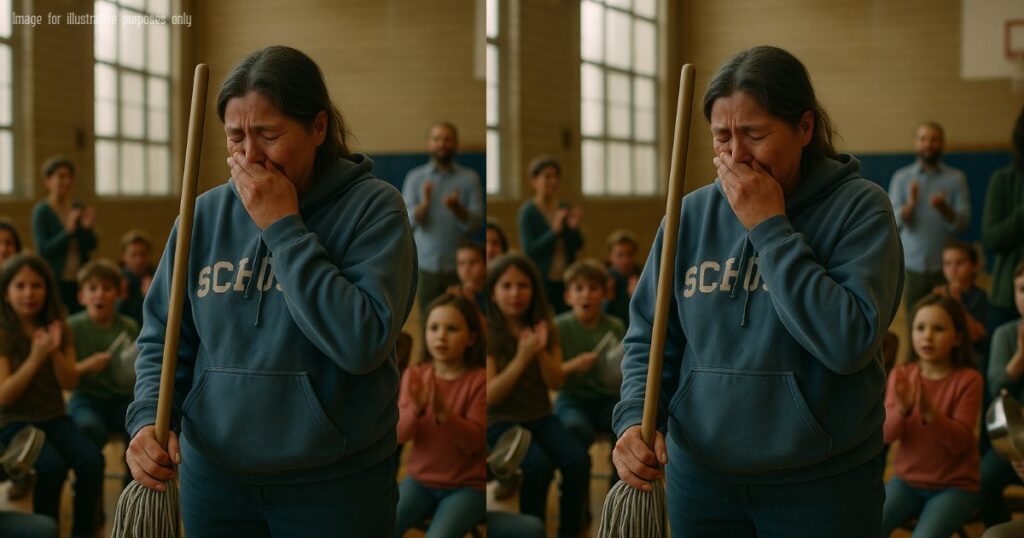“They clapped for me during COVID. Then outsourced my job to a robot.”
That’s how it ended. Not with a handshake. Not with a thank you. Not even a damn human voice on the line. Just a kid in a collared shirt I’d never seen before, reading off a script through Zoom, telling me my services were “no longer needed.”
My name is Darlene Foster. I cleaned the same public elementary school in Springfield, Missouri, for twenty-eight years.
I was there before the smartboards, before the laptops, before the bulletproof backpacks. Back when kids brought sack lunches in brown paper bags and the only virus we feared was the common cold.
When COVID hit, they called us “essential.” Like we were soldiers. Like we mattered.
And I believed them.
I scrubbed every inch of that school with bleach-soaked rags and aching hands. Classrooms. Bathrooms. Cafeteria trays. Doorknobs. Desks. You name it, I cleaned it. Twice. Some nights I didn’t get home ‘til 2 a.m., only to be back at 6. The masks rubbed raw spots behind my ears. My knees gave out more than once on the tile floor.
But I kept going.
Because those kids — those scared, quiet kids — still came in, and someone had to make sure their little world was safe.
I remember the first time they clapped for us.
It was April 2020. They lined the halls six feet apart, little ones and staff, banging on pots and pans like we’d won a war. I cried. Right there, in the middle of the gym floor, holding a mop.
Principal Sanders handed me a card that said “You are our hero.”
I still have it. Right next to my Social Security card, because these days, it matters more.
But heroes, I’ve learned, don’t get pensions.
When things “returned to normal,” the hugs stopped. The clapping faded. Budget meetings started. And one by one, folks like me disappeared.
They said the new cleaning drones were “more efficient.” Said we should “reskill” or “retrain.” I was fifty-nine, with arthritis in both wrists and a high school diploma from 1981. What exactly was I supposed to retrain into?
A TikTok star?
The day I got fired, I was sitting in my living room. Still wore my school hoodie — it was faded, with bleach stains on the sleeve.
The school crest embroidered crooked on the chest. My grandson bought it for me after I finished a particularly brutal week disinfecting after an outbreak.
I logged into the meeting using my daughter’s old Chromebook. The screen was cracked at the corner, like my pride.
And there he was — “Eli from Facilities Optimization.” Couldn’t have been more than twenty-seven. Kept calling me “Miss Foster,” like it was supposed to soften the blow.
“Miss Foster, we’re moving to an automated sanitation system next quarter. Unfortunately, that means your role will be phased out.”
I stared at the bookshelf behind him — filled with management books he probably never read. And I thought about the real books I used to dust off in the school library, the ones with creased spines and gum stuck to the pages. Books that smelled like learning.
I didn’t cry then.
Not until the meeting ended and the screen went black.
Some nights I still dream I’m mopping the cafeteria. I can hear the buzz of the old fluorescent lights, the smell of industrial soap and tomato sauce.
I see the little chalk drawings left on the blacktops. “We love you, Miss Darlene,” one kid wrote in rainbow sidewalk chalk during the second lockdown.
They forgot to power wash that one. Or maybe someone left it on purpose.
You can tell a lot about a school by how it treats its janitor.
I was never just the lady with the mop. I was the one who noticed when Tommy stopped smiling after his mom got sick.
I was the one who picked up Layla’s art project from the trash when it got stepped on and taped it back together. I found lost retainers, cleaned up vomit, comforted crying kids who had accidents in class and didn’t want to be teased.
They say machines don’t judge.
But machines don’t care, either.
Last week, I drove by the school. Just out of habit. My hands still twitch at red lights like they’re ready to scrub.
It looked shinier somehow — new windows, new LED signs flashing “Welcome Back Tigers!” in perfect, soulless fonts. But something was missing.
That warm hum of human mess.
No mop buckets in the corner. No handprints on the glass. No old lady with a cart humming Patsy Cline under her breath while she cleaned up the remnants of childhood.
I sat in my car a long while.
Thought about going in. Just to say hi.
But I didn’t.
Didn’t want to see if anyone would recognize me. Didn’t want to test the silence of a place that used to be noisy with life and echoes of thank yous.
Now, I spend my mornings walking the neighborhood with a trash bag and a reacher stick. Habit dies hard. Kids ride bikes past me and nod. One of them — I think it’s the Baker boy — stopped last week and said, “Hey, weren’t you the janitor at Roosevelt?”
I smiled and nodded.
“My classroom always smelled like lemons. That was you, right?”
“Sure was,” I said.
He gave me a thumbs-up and sped off.
That meant more than a certificate ever did.
See, I don’t need medals or press releases. Just a little decency. A little memory.
They clapped for me when it was convenient. Called me a hero when it served the story.
But heroes don’t vanish. We stick around.
Sometimes in memories. Sometimes in lemon-scented floors.
And sometimes in the sidewalk chalk no robot will ever wash away.


